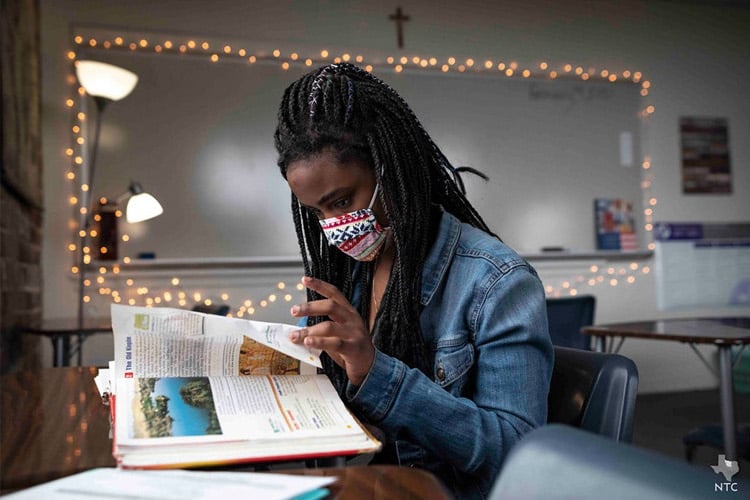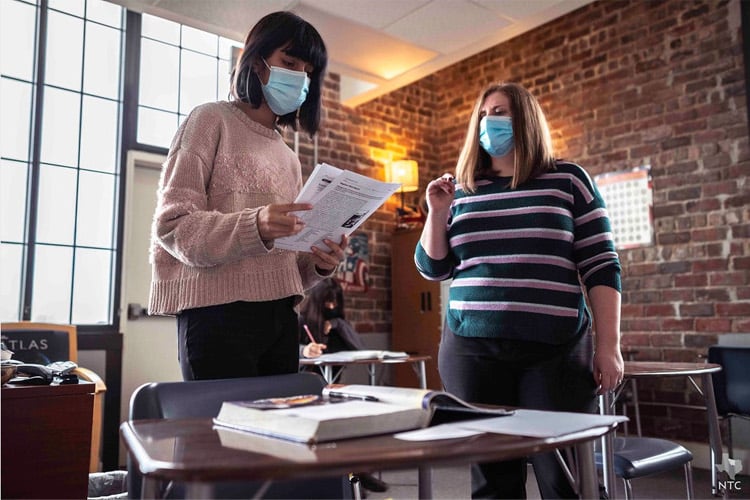Lifting Students Up: Cassata High School Offers an Individualized Alternative

Fiona Schoonover reads from a book while taking notes in social studies class at Cassata Catholic High School on February 4, 2021. (NTC/Ben Torres)
FORT WORTH — Melody Derrig wishes a place like Cassata Catholic High School existed when she was a student. As a teenager, undiagnosed learning issues kept her from mastering college preparatory courses in foreign language and advanced science. Choosing easier classes as a path to graduation, the Fort Worth native still remembers the dire prediction made by her high school counselor.
“She told me I would never amount to anything because I struggled so badly in school,” Derrig said.
Now the mother of 18-year-old Ben and 16-year-old Madeline, the former bookkeeper/receptionist is grateful her children are enjoying a very different high school experience. Both are enrolled at Cassata Catholic.
“Everyone in that building lifts you up,” she observed. “The teachers, staff, and counselors are always asking the kids how they’re doing. No matter what’s going on, they walk with them.”
Opened in 1975 by Sister Mary Fulbright, SSMN, and the late Sister Mary Bonaventure Mangan, SHSp, the Cassata Learning Center was designed originally to help dropouts and other at-risk students earn a high school diploma. The religious sisters believed providing an education to young people who couldn’t thrive in a traditional classroom prevented a lifetime of lost opportunities, unemployment, and poverty.
Heralded as one of Fort Worth’s first alternative secondary schools, Cassata Learning Center offered individualized attention, a self-paced curriculum, and independent study. The innovative approach attracted students from all socioeconomic backgrounds and a groundswell of community support.
Expanded student body
Forty-five years later, the school boasts an impressive list of graduates and a broader range of students who want a more flexible academic environment.
“We used to accept students 16 and older because there was a sense that you needed a certain level of maturity to self-pace and self-motivate,” explained Dr. Maggie Harrison, who currently serves as Cassata’s president and principal.
Four years ago, the school decided to welcome its first group of freshmen.
“Most came from elementary schools in the diocese,” the administrator added. “Some students are not well-suited to big traditional high schools and Cassata is happy to serve them.”
In a conventional high school, classes are bigger, the days are longer, and there’s more anonymity. Young people with emotional needs or suffering from depression often find a smaller school reduces the pressure to conform and perform.
“Here we know our students and know their families,” Harrison pointed out. “With our resources, we’re able to meet them there they are and provide a safe, supportive environment.”
The COVID-19 pandemic intensified that commitment. Last March, in the early days of the health crisis, Cassata began online instruction. Over the summer, the school developed a safety guideline plan and, like other Catholic schools in the diocese, opened its doors once again to students.

Social studies teacher Julianna McConegly works with student Melanie Cortis on an assignment at Cassata Catholic High School in Fort Worth February 4, 2021. (NTC/Ben Torres)
A hybrid schedule allows both online and in-person learning with about 40 percent of students receiving strictly online instruction.
“The pandemic forced us to be more resourceful, creative, and forward thinking,” said Harrison, noting that some classes are designed for “after hours” learning. Pupils can study material in the evening and contact teachers via email or by scheduled appointment.
After the pandemic is over, online learning will continue.
“Because we see a need for that,” stressed the foreign language specialist. “We want to be as versatile and flexible as possible.”
A patient, loving teaching staff is another key element in Cassata’s winning formula.
“They never give up and find ways to work with students,” Harrison said approvingly.
Commencement at the end of each semester is always a bittersweet moment.
“We’re happy they are graduating but also sad because we become attached and invested in their progress and future plans,” Harrison continued.
Graduates find success
While attending different private schools, Chandler Wewers was always uncomfortable passing the administration office. For no reason, seeing authority figures in the hallway always made her nervous.
That wasn’t the case the first time she met Cassata High School’s president as a sophomore.
“I instantly felt at home,” recalled the 19-year-old who grew up in Colleyville. “Talking to Dr. Harrison was like meeting a best friend.”
Wewers transferred to Cassata because she didn’t like the “vibe” at her previous school and wanted to graduate early. Now a journalism major at the University of Kansas, the undergraduate credits her Cassata teachers for an easy transition from high school to college.
“I have amazing professors but none of them are like my teachers at Cassata, who cared and wanted me to succeed,” admitted Wewers, who learned life skills, as well as academics, at the Hemphill Street. campus. “I know how to speak to adults and write an effective email. I’m a lot more prepared than my classmates here.”
After graduating from St. George Catholic School in Fort Worth, Angela Quintero enrolled in Cassata for a different reason. Caring teachers helped her cope with crippling anxiety and “find my voice,” she said.
“I didn’t think a big school could help me manage what I was going through at the time,” the 20-year-old added. “When I visited Cassata, it felt like a safe place.”
Individualized attention and a format that allowed her to self-pace provided a comfortable learning environment. A flexible classroom schedule also gave Quintero the chance to watch her mother, a social worker, help homeless people and veterans find housing. The experience encouraged her to explore a career in social work.
“I’d go with her on days when clients were moving into their first apartment and saw the difference that made,” said the Cassata graduate, who now attends Texas Woman’s University. “That was the type of opportunity I could have because I was at Cassata.”
Funding the future
Success stories like Quintero’s are the focus of Noche de Gracias — a virtual fundraiser set for April 27. The “Night of Thanks” will remember the legacy of Cassata’s founders as well as the students, families, staff, and foundations who worked over the years to ensure the school’s existence.
Melody Derrig, co-chair of the event, remains an ardent supporter of the school because of what she’s witnessed firsthand.
“They make sure the kids are number one,” the St. Patrick parishioner said.
If a teacher is in the middle of a conversation with a parent, and a child comes in with a question, the conversation stops, and the student is taken care of first.
“I love that,” Derrig said appreciatively. “Cassata provides a nurturing environment and so many kids need that today.”
The mother of a Cassata sophomore and senior feels passionately about the school because of its mission.
“I want to keep it going not just for my kids, but for the future of other children who need one-on-one attention,” she said. “It’s not just a school for dropouts and troubled kids anymore.”
